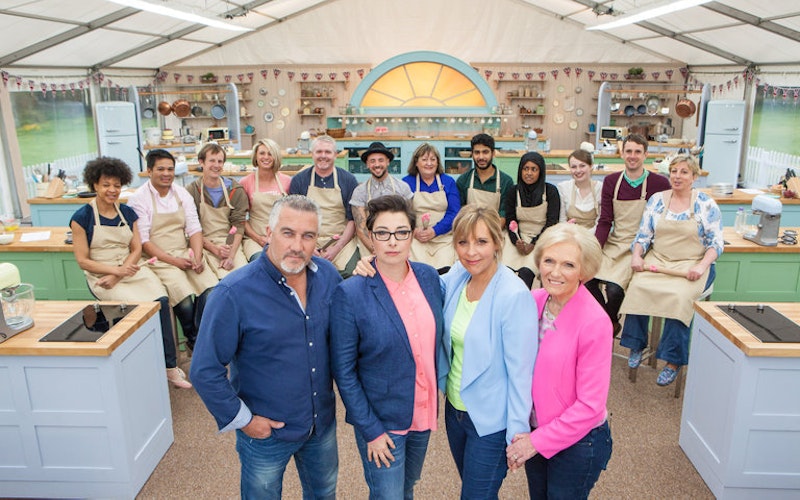
TV
Tasting Heaven in The Great British Baking Show
He told them still another parable: "The kingdom of heaven is like yeast that a woman took and mixed into about sixty pounds of flour until it worked all through the dough." (Matthew 13:33)
Jesus apparently loves food. Eating and tasting accompanied much of his ministry, from his first miracle of turning water into wine to his approval of his disciples picking heads of grain on the Sabbath to the various meals he shared in people’s homes—and all culminating in the Last Supper. Jesus even calls himself “the bread of life.” Often he used the image of a feast or banquet in his enigmatic descriptions of the kingdom of heaven, a future reality breaking into the present, and perhaps best seen through the cultural significance of a meal.
As I watched seasons 2 and 3 of The Great British Baking Show, now streaming on Netflix in the United States, I became increasingly aware of this kingdom-of-heaven reality being enacted on the screen. TGBBS is, paradoxically, a compassionate competition show. Twelve contestants show off their baking techniques before a pair of judges, Mary Berry and Paul Hollywood, who award a “star baker” each week and send home someone else whose skills didn’t quite make the cut. In stark contrast to the ruthless ambition or verbal abuse often portrayed in similar reality shows, there is an ethos of kindness in the massive tent erected in the British countryside, which serves as the makeshift bakery. Hosts Sue Perkins and Mel Giedroyc use their quirky British humor to keep spirits light, and the contestants applaud each other’s successes and grieve with each other’s failures. The show is incredibly diverse in every way imaginable—food, ages, ethnicities, faiths, and locations. It doesn’t necessarily highlight this diversity either; this reality simply is, a unity of rich and various cultural backgrounds and contexts. The emphasis is placed on each baker’s personality, their creativity in using flavors, decorations, and techniques to achieve that perfect bake. To riff on Galatians 3:28, there is neither male nor female, old nor young, rich nor poor—all come together under one big tent of baking.
TGBBS is, paradoxically, a compassionate competition show.
Despite being uplifting, there isn't a mawkish, Kinkadian sentimentality to the show. Mistakes are made and critiqued accordingly, and the tent is often a scene for chaos or panic. It’s quite stressful to stand before a judge and present what you have created, especially if things have not gone according to plan. In the first episode of season 3, a baker pulls up the acetate holding her showstopper cake in place, only to have the entire bottom layer melt like a chocolate volcanic ooze. The shock and pain on the baker’s face is palpable, but where another show might attempt to isolate her as a buffoon or offer another contestant’s harsh appraisal in order to foster drama, TGBBS chooses the way of compassion. Sue, the co-host, places her arm around the distraught baker’s shoulders in a moment of genuine tenderness, and whispers, “It’s just a cake. It doesn’t mean you’re going to go home.” In TGBBS, mistakes are acknowledged and judged, but grace is also present. When the perfect bake is achieved, it’s a moment for genuine joy.
Of course, nearly every contestant does eventually go home—until they’re brought back for the final episode in a celebratory lawn party. There’s little sense of jealousy or wounded pride. The entire closing ceremony feels akin to a homecoming, where old friends are reunited and praise one another as they feast on a smorgasbord of baked goods. In crowning the winner of season 2, Paul and Mary describe their choice of the triumphant baker not due to a competitive spirit, but as someone who genuinely learned and matured over the course of the show, growing in personal confidence as well as the baking craft.
TGBBS emphasizes compassion over competition, creativity over contest, and celebration over castigation. Perhaps this television show, in its ethos and its delicious food, is a little taste of the kingdom of heaven. As Mary Berry would put it, it’s absolutely scrummy.
Topics: TV, Culture At Large, Arts & Leisure